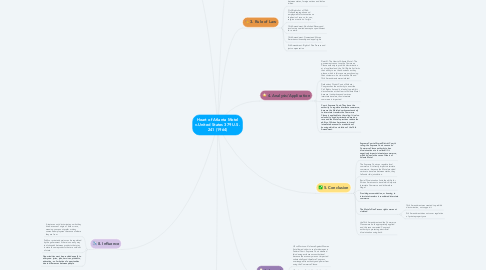Heart of Atlanta Motel v.United States 379 U.S. 241 (1964)
by Jillian Alm


1. 1. Facts
1.1. Parties: Heart of Atlanta Motel, District Court, Supreme Court
1.2. What Happened: Heart of Atlanta Motel sued the US Government saying Congress was not allowed to pass the Civil Rights Act because it was unconstitutional and violated their due process authority to run their business as they wished.
1.3. Procedural History: The case first went to the district court where the Motel loss and the Civil Rights Act was upheld as constitutional under the Commerce Clause.
2. 7. Importance
2.1. the Civil Rights Act of 1964 was supported and strengthened. This case reaffirmed the legality of the Act and Congress' authority to regulate interstate commerce using their authority from the Commerce Clause.
2.2. Businesses must be aware of where their service/ industry falls in terms of state vs federal jurisdiction. The impact of their business in different states effects how they are regulated and which laws they could potentially violate.
2.3. this case proved that the Supreme Court could rule over a private establishment if there was a public impact to commerce
2.4. All businesses must abide by the Civil Rights Act and cannot discriminate or segregate. This applies to many aspects of business, but particularly to Human Resources.
3. 8. Influence
3.1. A state can not discriminate on who they hire because of origin of birth or race, meaning you cannot prefer or deny someone employment because of where they are from.
3.2. Public or private domains can be regulated by the government if there is no easy way to distinguish between products that stay in state vs same products that are sold out of state.
3.3. Opportunities must be provided equally to everyone - juries, jobs, services, products, education - no limitation of opportunities due to differences between people
4. 2. Issue
4.1. Can Congress prohibit racial discrimination in public places using the Commerce Clause?
5. 3. Rule of Law
5.1. Commerce Clause: Congress has the power and authority to regulate commerce between states, foreign nations and Indian tribes.
5.2. Civil Rights Act of 1964: Outlaws segregation and employment discrimination on the basis of race, color, sex, religion or nation of origin
5.3. 13th Amendment: Abolished Slavery and involuntary servitude except as punishment for a crime.
5.4. 14th Amendment: Guaranteed African Americans citizenship and equal rights
5.5. 5th Amendment: Right of Due Process and just compensation
6. 4. Analysis/Application
6.1. Plaintiff: The Heart of Atlanta Motel - The government cannot use the Commerce Clause authority to prohibit discrimination at a local level and the Civil Rights Act limits their ability to run their business as they please, which in this case means choosing their customers - he claimed the 5th and 13th Amendments were violated.
6.2. Defendant: District Court of Atlanta - Congress has the authority to enact the Civil Rights Act and it is lawful to prohibit discrimination at the Heart of Atlanta Motel because it advertises and services interstate travelers, thus interstate commerce is impacted.
6.3. Court: Supreme Court: They have the authority to regulate interstate commerce, because the Motel advertises extensively to interstate travelers the Commerce Clause is applicable to the ruling. It is also unlawful to use discrimination based on race and the Motel's practices reduce the ability of African Americans to travel interstate because it's a reduction of housing which is a violation of the 14th Amendment.
7. 5. Conclusion
7.1. Supreme Court affirmed District Court's ruling- the Supreme Court can use its' Commerce Clause authority to ban discrimination at a local level if it negatively impacts interstate commerce, which it does in the case of Heart of Atlanta Motel.
7.2. The Supreme Court can regulate local commerce if it directly impacts interstate commerce - because the Motel provided service to travelers between states, they fell under this jurisdiction.
7.3. Racial Discrimination limits the ability for African Americans to travel which impacts Interstate Commerce and is therefore illegal.
7.4. Providing accomodation, or housing, to interstate travelers is considered interstate commerce
7.5. The Motel's Due Process rights were not violated
7.5.1. 14th Amendment was created to prohibit discrimination, not support it
7.5.2. 5th Amendment does not cover regulation of private property use
